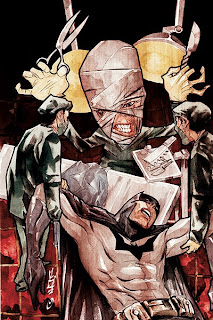Well now we have a bit of a clearer idea of what he's spending the money on. In a particularly cunning move, he seems to be exclusively donating towards the start-up costs of private businesses doomed to fail...
 Streets of Gotham #3 by Paul Dini and Dustin Nguyen (2009)
Streets of Gotham #3 by Paul Dini and Dustin Nguyen (2009)Ah, of course, the good old Monarch Card and Novelty Company will soon be re-opened for business. Hush's plan becomes a bit more devious now, doesn't it? Not only is he planning on exhausting all of the Wayne family resources, thereby significantly diminishing the ease and effectiveness through which Batman is able to fight crime, but he is also planning on tarnishing his reputation by investing in luxury businesses.
I see some problems with Hush's plan:
1) I know that Hush would be reducing unemployment (however only in the short-term) by investing the money to keep this factory open and that the public is sympathetic to anything that would employ the people of Gotham who have lost their jobs. Yet, it's not as if they're fooled to believing they'll be able to sustain the company. Hush seems only to be offering up the initial start-up money to keep the company open for, say, three months. After that, I can't imagine that the Monarch Card company would expect Elliot to pay for all its continued operation expenses. The media itself even admitted that the business is likely to fail and that there might not be a viable market for novelties and card games in these harsh economic times.
And it doesn't "remain to be seen." The random reporter is right. A recent TIME magazine article reports the results of a Nielson Co. study about businesses in the recession. Sports and novelty cards were down 26.5% demonstrating that people are cutting down on discretionary items.
If Hush were offering up free money for a longer period of time, sure it would be a fine idea. But so long as the company is going to have to continue devoting its resources towards a business that is extremely unlikely to succeed, why not just request that Wayne invest in a more viable company and employ the same people in those factories? Since individuals are going out less, they are buying more frozen foods and supplies to store at home. I bet Gotham could sure use some more canned food manufacturing.
I think Elliot's intent here is to have the company crash and burn, which would demoralize Gotham City even more. There would be an added bonus on having the public blame the Wayne family for investing resources poorly.
Besides, who would buy anything from a company called "Monarch" anyway? Oh wait, looks like lots of people from Maine already do.
2) I still don't understand how Hush has access to Wayne's money. It can't just be that looking like someone allows you to spend their billions of dollars. In fact, another panel in this issue (unpictured) actually shows Hush handing out a check that has no account number on it! Huh?
We'll have to wait for future issues to see the effects of Hush's plan on the Monarch Company as well as the Gotham City economy. Let's hope Dick and Damien can keep his charitable reign in check until then.
I see some problems with Hush's plan:
1) I know that Hush would be reducing unemployment (however only in the short-term) by investing the money to keep this factory open and that the public is sympathetic to anything that would employ the people of Gotham who have lost their jobs. Yet, it's not as if they're fooled to believing they'll be able to sustain the company. Hush seems only to be offering up the initial start-up money to keep the company open for, say, three months. After that, I can't imagine that the Monarch Card company would expect Elliot to pay for all its continued operation expenses. The media itself even admitted that the business is likely to fail and that there might not be a viable market for novelties and card games in these harsh economic times.
And it doesn't "remain to be seen." The random reporter is right. A recent TIME magazine article reports the results of a Nielson Co. study about businesses in the recession. Sports and novelty cards were down 26.5% demonstrating that people are cutting down on discretionary items.
If Hush were offering up free money for a longer period of time, sure it would be a fine idea. But so long as the company is going to have to continue devoting its resources towards a business that is extremely unlikely to succeed, why not just request that Wayne invest in a more viable company and employ the same people in those factories? Since individuals are going out less, they are buying more frozen foods and supplies to store at home. I bet Gotham could sure use some more canned food manufacturing.
I think Elliot's intent here is to have the company crash and burn, which would demoralize Gotham City even more. There would be an added bonus on having the public blame the Wayne family for investing resources poorly.
Besides, who would buy anything from a company called "Monarch" anyway? Oh wait, looks like lots of people from Maine already do.
2) I still don't understand how Hush has access to Wayne's money. It can't just be that looking like someone allows you to spend their billions of dollars. In fact, another panel in this issue (unpictured) actually shows Hush handing out a check that has no account number on it! Huh?
We'll have to wait for future issues to see the effects of Hush's plan on the Monarch Company as well as the Gotham City economy. Let's hope Dick and Damien can keep his charitable reign in check until then.






